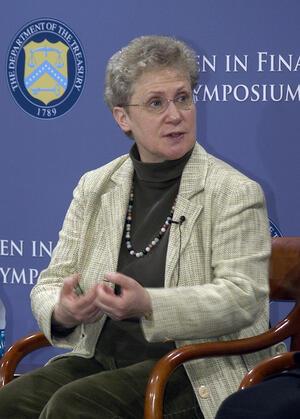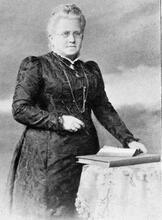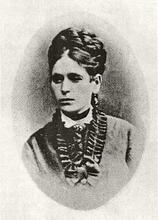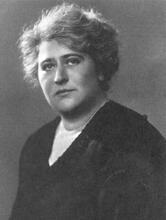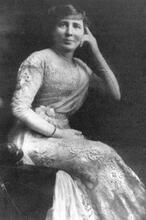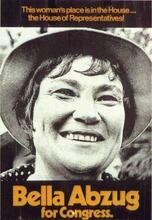Abby Joseph Cohen
Abby Joseph Cohen is a leading voice in the United States investment banking and finance industry. As an undergraduate at Cornell University, she was intrigued by the new field of econometrics that applied scientific and mathematical concepts and algorithms to economics. Her first job was as an economist with the Federal Reserve Board of Governors. She was then hired by investment management firm T. Rowe Price and eventually worked in the Goldman Sachs investment research division for over three decades, where she rose to prominence with her accurate predictions of a prolonged economic expansion and durable bull market. Having faced many challenges in combining marriage and children with a career in finance, Cohen was a pioneer in establishing new norms in work/life balance in the industry.
Abby Joseph Cohen is a leading voice in the United States investment banking and finance industry, working as economist and strategist in the Goldman Sachs investment research division for over three decades. She rose to prominence in the 1990s with her accurate predictions of a prolonged economic expansion and durable bull market and has remained one of the top names in the investment industry. She regularly appears on media outlets both within and outside the United States, for her research on global economies and consequences for government policy and financial markets. Cohen has been ranked as the #1 investment strategist by surveys of professional investors and appeared in the Fortune Magazine list of most influential women in business. Her career is the subject of a Harvard Business School case study, and she has been profiled by numerous publications, including the New York Times, the Financial Times, and The New Yorker Magazine.
Family and Education
Born on February 29, 1952, in Queens, New York, Cohen attended New York City public schools. Her father was an accountant and her mother worked in finance until she gave birth to her two daughters. Her parents, Raymond and Shirley (née Silverstein) Joseph, focused Cohen and her older sister Lillian on academics. Cohen exhibited early a particular talent in mathematics and science, with her first loves being physics and chemistry. As an undergraduate at Cornell University, she was intrigued by econometrics, the “rigorous” new field that applied scientific and mathematical concepts and algorithms to economics. She graduated in 1973 with a double major in economics and computer science and married David M. Cohen, a fellow Cornell graduate, the same year. They have two daughters.
As one of the first students to graduate with expertise in both computer programming and economics, Cohen took a job as an economist with the Federal Reserve Board of Governors after graduation to work on the most sophisticated economic model then in existence. While working in Washington, D.C., she attended graduate school at George Washington University and earned an MS degree in economics in 1976. Her training and expertise in econometrics provided a “wonderful entry point,” as she noted, into the work world, a world in which women at the time made up less than 5% of the industry (interview with author).
Early Career
In 1976 Cohen was hired by T. Rowe Price Associates, an investment management firm. One of the few professional women at the firm she faced many challenges and uninvited comments about combining marriage and children with a career in finance. Indeed, when a senior member of the firm asked about her personal life while driving to a client meeting, she recalls he almost skidded off the road when he discovered she was not only married but already had a child. While she jokes that there was never a line for the ladies’ room at her work engagements, she faced and overcame numerous challenges in the male-dominated world of finance. At T. Rowe Price, she was initially denied health insurance for her family: She was told that men were the primary wage earners and only they were entitled to that benefit. Cohen’s husband David, a labor lawyer, proved the policy was illegal, and she eventually got the family insurance coverage. “Even if men were getting accustomed to the idea of a woman working, there was a significant belief that once she had a child she should stop,” Cohen recalls (interview with author).
Cohen spent eight years at T. Rowe Price in Baltimore, MD, before being lured back to New York to be closer to family. She began work at Drexel Burnham Lambert as vice president in charge of investment strategy. The firm was among the first on Wall Street to combine “quantitative analysis” with economics, and Cohen’s role was to integrate the two. In 1988, she was promoted to chief strategist at Drexel Burnham Lambert, but the firm was liquidated in early 1990 following a legal settlement related to its former employee, the junk bond pioneer Michael Milken. She then served briefly as one of the first female heads of an investment bank’s research division when she was appointed director of research at the New York office of Britain's Barclay's de Zoete Wedd (BZW) group, a position she left after less than a year to become a senior strategist in the highly acclaimed research department at Goldman Sachs.
Growing Reputation
Concurrent with her move to Goldman Sachs, Cohen solidified her position as a well-known name in finance. She began her tenure with the firm as a vice president and co-chair of the Investment Policy Committee. She later became chair and chief U.S. portfolio strategist and rose to fame as Wall Street's best-known market guru during the bull market of the mid-1990s. While others predicted an imminent downturn, or correction, she maintained the market would continue to rise due to the exceptional durability of the U.S. economic expansion. She based this prediction on her thorough analysis of structural changes in the economy (such as low inflation and the growing importance of technology) and her deep engagement with economic data. She was correct, and before long hers was a known name, due to her ability to translate detailed analysis and predictions into simple, plain English for millions of Americans to understand.
Investors admired Cohen’s take on the economy and hailed her market analyses as prescient. As a result, she frequently appeared on television to discuss the economy and shared her research and views in such publications as Fortune, Business Week, and The Wall Street Journal. In addition to her sage analysis, she was celebrated in the international press for defying the late-twentieth-century Wall Street stereotypes concerning money, decadence, and power. As a Guardian headline summed up: “Abby Cohen lives in Queens and goes to work on the bus, but she is the Wonderwoman of Wall Street” (“She’s Got it Made”).
In 1996 Cohen was named a managing director at Goldman Sachs, and she became a partner in 1998 shortly before the firm went public. Much of Cohen's eminent reputation stems from her ability to translate her analysis to the masses and her continued top ranking with the highly influential Greenwich Associates, which surveys the opinions of professional money managers. In her time at Goldman Sachs, Cohen has not only advised investment clients but also spent much time working with finance ministers and other senior officials in foreign governments, along with United States government officials in the Department of the Treasury, the Federal Reserve Board, and the White House.
Work/Life Balance
Cohen was a pioneer in establishing new norms in work/life balance in the world of finance. Although she had no role model to lean on, her experiences helped set expectations for future generations of women in finance. Throughout her career, she has made sure that she did not sacrifice her family in the process. She organized business trips to be away from her family the least time possible and was an early proponent of working from home, noting that investment research often requires people to work from locations other than a central office. Her background in computer science allowed her home to become a beta test site for new equipment and software. “My family is my most important client,” she once claimed. “I always made a point to be at school plays or visiting days at camp. Those things go on my business calendar” (“Profile: Abby Joseph Cohen). This practice was unusual at the time, as many women were often secretive about their family responsibilities. Nor does Cohen let business intrude on Jewish ritual observances, such as family Friday nights or Jewish holidays, as she is her family’s “balabuste,” mixing matzo balls while calling in to make a client presentation. She even brought her family with her to Japan when a business trip that overlapped with A seven-day festival to commemorate the Exodus from Egypt (eight days outside Israel) beginning on the 15th day of the Hebrew month of Nissan. Also called the "Festival of Mazzot"; the "Festival of Spring"; Pesah.Passover could not be rescheduled. She has noted that her mother lost most of her relatives in the Holocaust, so her smaller family divided between Israel and the United States always “cherished one another. Nothing is so important that it should cause a rupture or division” (“Profile: Abby Joseph Cohen). While stepping out of Goldman Sachs’ partnership in 2018, Cohen still works as an advisory director at the firm.
Cohen began her career when women were considered “diversity” in the world of finance and feminism was barely mentioned let alone a force in finance. Her success and her longevity in a field in which many are forced to retire at 50 defy clichés about an industry notorious for its treatment of women. Balancing her demanding career and her family prodded her to argue that “every male C.E.O. in the country should be required to have a working wife.” “Without working wives,” she notes, “senior men, including C.E.O.’s, don’t understand their employees’ balancing act—not just those faced by the women but also the stresses on the younger generation of men” (“Profile: Abby Joseph Cohen). While she had no role models in the firms where she worked, she notes, she found inspiration from her mother and the advice she offered. “She always spoke her mind and was almost always right in her judgments,” Cohen recalls. “She was never afraid to admit an error but never held back in sharing her views” (“Profile: Abby Joseph Cohen”).
Cohen focuses her philanthropy on issues related to education, technology, and Israel. She has served on boards as varied as Cornell University, the Brookings Institution, the Economic Club of New York, and the Yiddish Book Center, and she has been board chair for the Jewish Theological Seminary, the Chartered Financial Analysts Institute, and the Jacobs Innovation Center at Cornell Tech, a combined effort of Cornell and Israel’s Technion Institute.
Abby Joseph Cohen, Oral interview with the author, August 5, 2020.
Cambell, Dakin. “Abby Joseph Cohen, Famous for Bullish Calls, Plans to Retire.” Bloomberg, February 19, 2017.
Musleah, Rahel. “Profile: Abby Joseph Cohen.” Hadassah Magazine, February 2005.
Truell, Peter. “The Wall Street Soothsayer Who Never Blinked.” New York Times, July 27, 1997.
Solomon, Deborah. “A Steady Hand.” (Interview with Abby Joseph Cohen). New York Times Magazine, January 28, 2011.
Usborne, David. “She’s Got it Made.” The Independent, March 21, 1999.
Vigna, Paul. “A Look Back at Abby Joseph Cohen’s Calls at Goldman.” Wall Street Journal, February 12, 2017.

